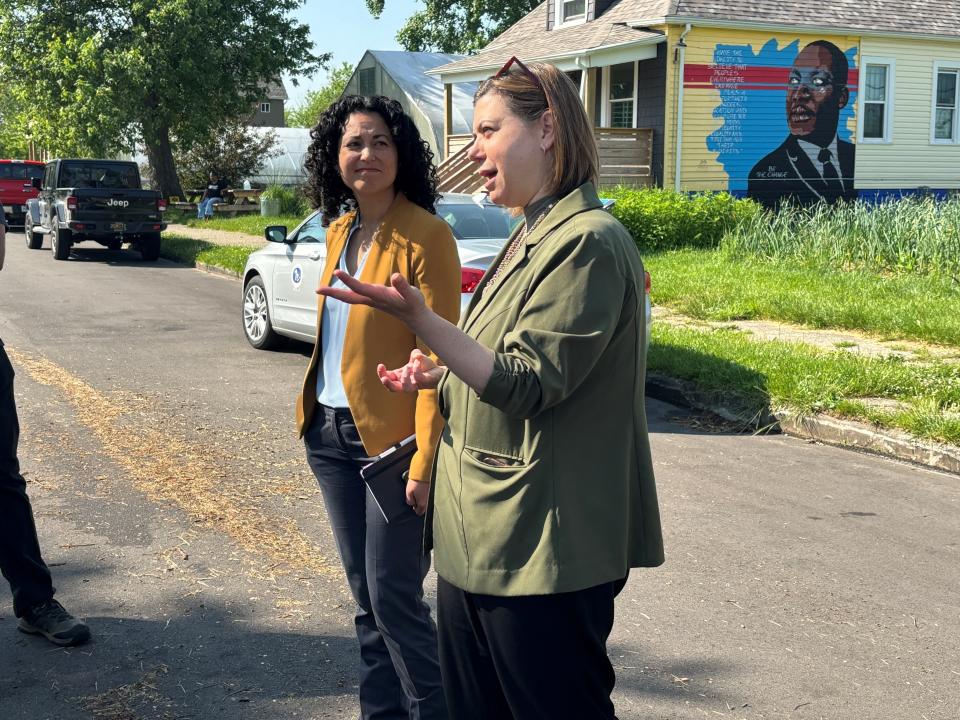In US Senate primary race between Slotkin, Harper, the choice is clear | Endorsement
When Elissa Slotkin made her political debut in 2018 as a candidate for the U.S. Congress’ 8th District, she was one of the best qualified candidates this newspaper’s editorial board had ever seen.
U.S. Rep. Slotkin is now seeking her party’s nomination for the open U.S. Senate seat soon to be vacated by retiring Sen. Debbie Stabenow.
Six years in the House of Representatives have only enhanced her formidable talents. Michigan voters should not hesitate to choose ELISSA SLOTKIN in the Aug. 6 Democratic primary.
Michigan's Senate campaign is one of the most-watched races in the nation. The winner of the party primary will have a tough general election fight ahead.
Michiganders have been privileged to enjoy a series of senators who have worked diligently to improve the lives of their constituents, placing service above all else. For 24 years, Stabenow carried that mantle, patiently building relationships across the aisle, even during times of great political stress, that enabled the passage of essential legislation — like the agricultural bills that provide subsidies to Michigan farmers and food assistance to Michiganders in need.
Slotkin is eminently qualified by any measure, and we believe she is also the candidate most suited to carry on this tradition of service.

Clear policy objectives
Slotkin, 47, is a native of Oakland County who enlisted in the CIA after 9/11, serving three tours of duty in Iraq. She served in the National Security Council under then-president George W. Bush, and then as acting Assistant Secretary of Defense for National Security Affairs under former President Barack Obama.
Despite her background, Slotkin isn’t the warmonger her most outspoken critics claim. While she retains an insider’s nuanced understanding of national security, her legislative focus is primarily domestic: Slotkin decided to trade technocracy for politics because of political polarization in our own country.
In an endorsement interview last month with the Detroit Free Press Editorial Board, Slotkin described her north stars:
Our multi-cutural, multi-racial democracy should offer opportunities for anyone — longtime citizens or new arrivals — to enter the middle class
The need to manufacture more things in America
Protecting our children from the greatest threats to their well-being — gun violence (now the number one cause of death for American children and teens) opioid and fentanyl addiction, and in the longer term, climate change.
It's an unusual display of clarity around a set of policy objectives that ought to be achievable.
Slotkin is a prodigous fundraiser; she had raised $16 million by the end of the last reporting period.
Critics have said Slotkin lacks experience representing communities of color. The congresswoman notes that she has represented Lansing — 23% Black, 12% Hispanic — for her entire tenure in office, but also acknowledges that she had work to do: "I’m honest about it, and I practice radical transparency."
Slotkin says she’s held 80 community meetings in Detroit, most of them not for media consumption, because she wants to get to know the communities she hopes to represent.
“It is completely clear when you walk into a community event in Detroit that a cloud hangs over the city because for the first time in over 65 years, there's no African American representative of the city at the federal level," she said. "The community is very used to white politicians coming in before an election promising the world, and then never showing up again. So that's what I acknowledge right up front. And while I can't prove to people what I'll do after I'm elected, what I can prove is that I can ... show up and show up and show up ahead of time, and take the lessons that I'm learning into my current life as a legislator.”
Her efforts convinced the influential Council of Baptist Pastors of Detroit and Vicinity, which endorsed her last week.
When Slotkin is elected, we’ll hold her accountable to both promises: to the exercise of radical transparency, and to keep showing up.

Hill Harper
Detroiter Hill Harper is also on the Aug. 6 primary ballot. Dearborn businessman Nasser Beydoun was disqualified over a petition error.
An actor, lawyer, small business owner and activist, Harper speaks compellingly about his decision to run and his connection to Michiganders. When he notes that he would be the only parent of a school-aged child in the U.S. Senate, the significance is not lost on us.
Harper is unabashedly progressive, and pledges to be a fierce advocate for education and diverse communities. He had raised about $2 million at the end of the last reporting period, and won the endorsement of a host of powerful Black Michigan Democrats, like Wayne County Executive Warren Evans and former U.S. Rep. Brenda Lawrence.
We feel keenly the need for Black Democratic political representation in Washington.
But Harper simply isn’t as qualified as Slotkin.
And at times, his campaign has veered onto shaky ground.
Harper, who starred on the popular ABC show “The Good Doctor” until last year, has called Slotkin “the real actor” in the race, a bizarre ad hominem attack. He has said repeatedly that Slotkin did not employ any Black staffers until she began her Senate campaign, a claim that is provably untrue. He also claimed that Slotkin voted against a bill that would allow Americans to expunge federal marijuana crimes from their records. She voted for the bill.
Harper’s willingness to misrepresent his opponent gives us pause; we fear it may predict how he’d operate as a lawmaker.
More from Freep Opinion: Why are Michigan's Black leaders backing longshot Senate candidate?

Empathy and pragmatism
Slotkin said her experience as a CIA analyst taught her to analyze the tangible impacts of policy, and to value real need over political expediency, and she said her platform as a lawmaker gives her the ability to convene opposing groups for real conversation on neutral ground.
During the series of campus protests over the war in Gaza this spring, and a string of graduation ceremonies disrupted by student protesters, Slotkin brought Jewish and Muslim leaders together. “We have to keep lines of communication open, even when it’s difficult ... “It’s extremely important for us to see each other as human beings."
After the 2020 murder of George Floyd by Minneapolis police, and the protests and calls for police reform that followed, Slotkin brought Lansing police leaders together to change how the department responded to mental health calls. Those conversations resulted in a bill, led by Slotkin, to provide federal funds for departments to hire social workers; in Lansing, it was $1.3 million.
Slotkin, the only Jewish member of Michigan's congressional delegation, has taken a similarly thoughtful, pragmatic approach to the Israel-Hamas War. Since the early days of the war, Slotkin has warned that Israel’s response to the Oct. 7 attacks — a bombing campaign and ground invasion of Gaza that has left more than 35,000 Palestinians dead, according to the Palestinian health authority — simply won’t result in the outcome Israel’s staunchest defenders could want.
“You can win the war, but lose the battle for security,” she said. Slotkin has supported both a cease-fire and humanitarian aid to Gaza, and we hope she is willing to continue putting pressure on Israeli leadership to end the violence.
Slotkin's thoughtful predisposition has the potential to bring people from opposite sides of a seemingly intractable conflict to the proverbial table, in the community or in Congress.
It’s pragmatism tempered by empathy, and we can’t help but think that in an increasingly contentious U.S. Senate, Slotkin’s approach will bear fruit for Michiganders.
Submit a letter to the editor at freep.com/letters.
This article originally appeared on Detroit Free Press: Michigan Democrats should vote for Slotkin in US Senate primary
